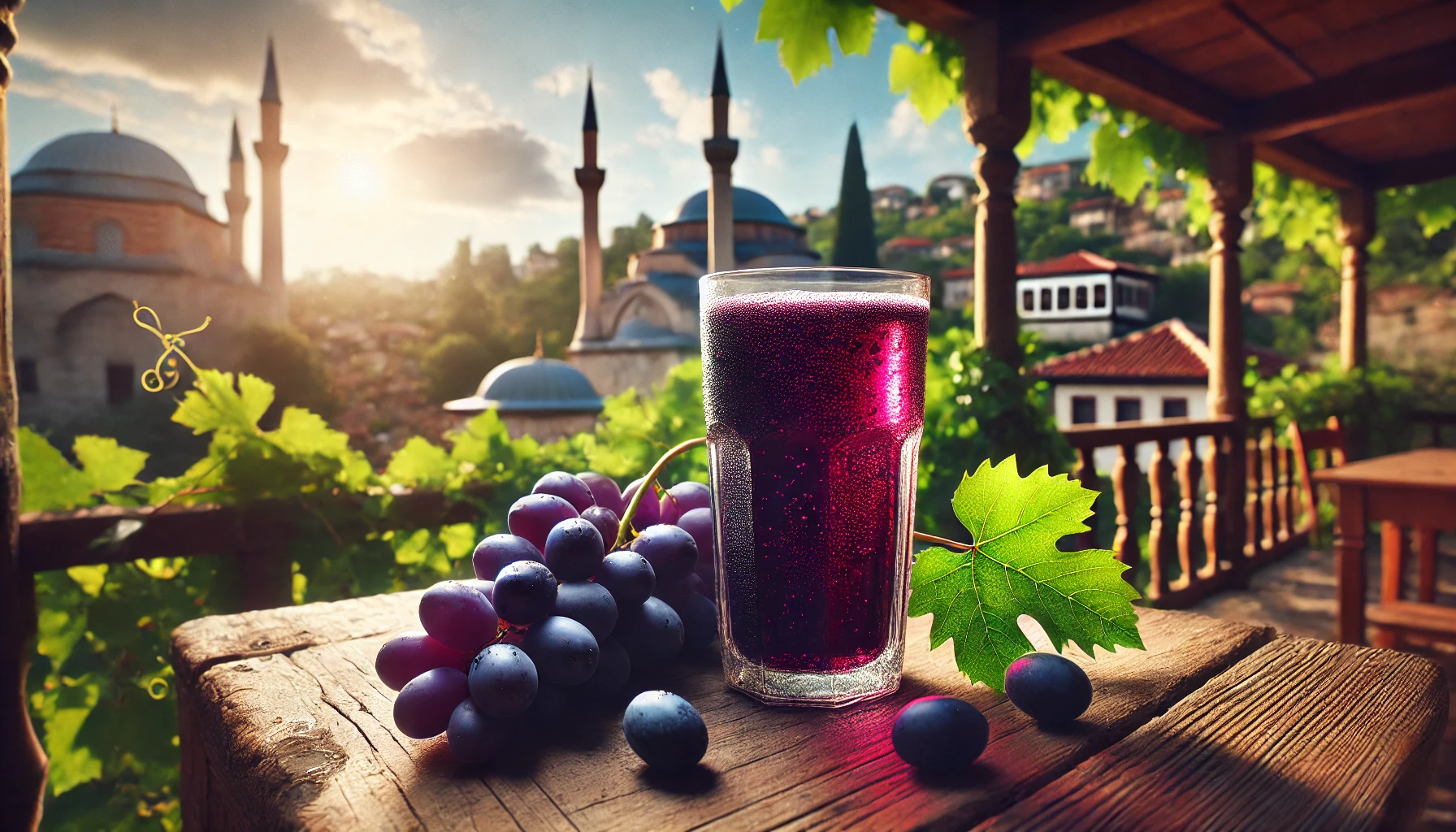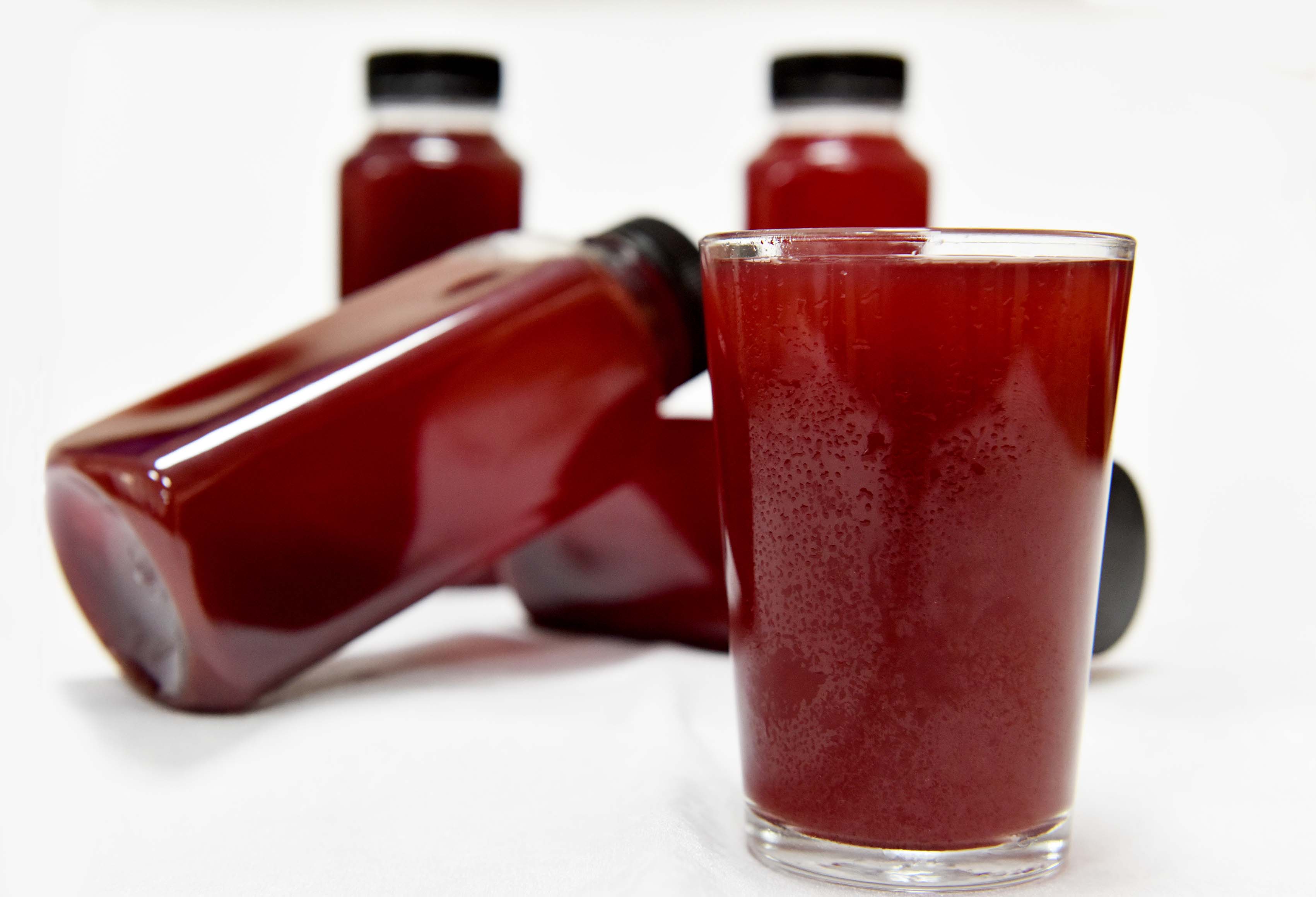Bursa Grape Must is a non-alcoholic beverage uniquely produced in Bursa province, Türkiye, prepared using black raisins, drinking water, and optionally, white sugar. This product, which has geographical indication registration, can be produced using both traditional and industrial methods, and no spices are used in its production process. Bursa Grape Must, to which black carrot juice can be added as a color stabilizer, possesses unique qualities derived from grape skins and seeds, thanks to the natural resveratrol it contains. In a cultural context, this must is considered one of the historical beverages of Bursa cuisine and finds its place in social meals such as special occasions, ceremonies, and iftar tables.

Bursa Grape Must (Generated by Artificial Intelligence.)
Distinctive Features
Bursa Grape Must is prepared with a mixture of mainly seeded black raisins, drinking water, and optionally white sugar. Black carrot juice is used as a color-stabilizing additive. One of the distinguishing aspects of the product is that no spices are used in its production. Bursa Grape Must can be produced by both traditional and industrial methods.
The unique quality of this beverage stems from the grape variety preferred in its production. The seeded black raisins used in Bursa Grape Must are varieties rich in high amounts of resveratrol. Resveratrol is an antioxidant substance found especially concentrated in the skin and seeds of black grapes. This beverage, linked to Bursa's culinary culture, is consumed during ceremonies, celebratory meals, iftar tables, and on special occasions.
Traces of this product are also found in historical sources. In Evliya Çelebi's work titled Seyahatnâme, grape vineyards around Lake Uluabat, red grape must, and the fish varieties in the region are mentioned.
Recipe and Production Method
Bursa Grape Must can be produced in two different ways: the traditional method and the industrial method.
Traditional Production Method
Ingredients:
- Seeded black raisins (10 kg)
- Drinking water (80–100 liters)
- White sugar (8–10 kg, optional)
In this method, approximately 10 kg of seeded black raisins, 80-100 liters of drinking water, and 8-10 kg of white sugar are used. The grapes are washed several times to remove spoiled berries, then crushed through a shredder. After adding drinking water and letting it sit in a cool environment for one day, it is strained using a cheesecloth. Drinking water and sugar are added if necessary by adjusting the density. The prepared mixture is stored in stainless steel containers at +4 °C and usually consumed within 1-2 days. If fermentation begins, the product can be tasted and kept for a maximum of 3-4 days. It is served cold in open glasses or capped bottles.
Industrial Production Method
Ingredients:
- Seeded black raisins (20–40 kg)
- Drinking water (40–80 liters)
- White sugar (10–30 kg)
- Black carrot juice (0.200–0.800 kg, as a color stabilizer)
- Citric acid (0.05%–0.1%, depending on the acidity of the raw material, as an acid regulator)
In this method, 20-40 kg of seeded black raisins, 40-80 liters of drinking water, 10-30 kg of white sugar, and 0.200-0.800 kg of black carrot juice are used. Depending on the acidity of the raw material, 0.05% to 0.1% citric acid can also be added. After washing, the grapes are passed through a shredder and left to sit with drinking water for one day. The resulting mixture is filtered to separate pulp and seeds. Unlike the traditional method, in this method, the must is boiled. Sugar is added if needed. Black carrot juice is added for color stabilization. After the mixture is pasteurized, it is hot-filled into hermetically sealed bottles and stored after cooling.
Geographical Boundary and Production Conditions
The historical and cultural ties of the product are limited to the province of Bursa. In this context, all production, processing, and other operations of Bursa Grape Must must be carried out within the geographical boundary of Bursa province. The renown linked to the geographical boundary is directly related to both the product's presence in historical documents and the grape diversity and production tradition in the region.
Inspection
Following the product's registration, the conformity of production is inspected under the coordination of the Bursa Chamber of Commerce and Industry. The inspection board consists of a team of at least three people, comprising representatives from the Bursa Chamber of Commerce and Industry, Bursa Provincial Directorate of Agriculture and Forestry, Bursa Uludağ University Faculty of Agriculture, and Bursa Technical University Food Engineering Department. Inspections are carried out at least once a year and can be conducted at any time in case of complaints or need.
Within the scope of the inspection, the suitability of the seeded black raisins and other materials used in the product's production, the production method, and the correct use of the geographical indication emblem are particularly controlled. During the inspection process, expert support can be obtained from public or private organizations.
 Bursa Grape Must (Turkish Patent)
Bursa Grape Must (Turkish Patent)

